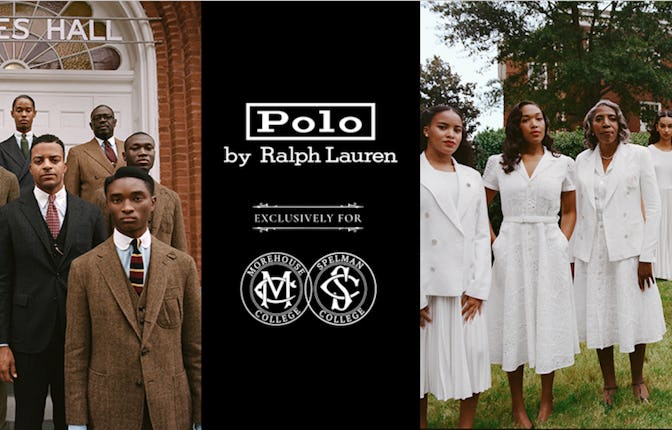I’m cautiously optimistic about this Ralph Lauren x HBCU collab
It’s spearheaded by two HBCU alums, but as a recent Spelman graduate I know all too well how the history of our institution can get romanticized.

Ralph Lauren just announced its latest collaboration: a capsule collection with Morehouse and Spelman College, two venerable HBCUs in Atlanta. The limited-edition collection will be available to the public on March 29 and will also be sold on each campus while supplies last.
The collection was conceptualized and designed by Morehouse alum James Jeter, director of concept design & special projects for Ralph Lauren, in collaboration with Spelman graduate Dara Douglas, director of inspirational content for Ralph Lauren. Perhaps as a precursor to the collection, Ralph Lauren donated $2 million in scholarship funding to Morehouse and Spelman to split with 10 other HBCUs across the country in late 2021. The collabo appears to be the first work of its kind for the brand that has consistently embraced the Ivy WASP aesthetics of the 1960s, so it’s safe to say that we’re all curious to see what they have in store.
“This collection expresses the spirited history, deep sense of community, and legacy of timeless dressing at historically Black colleges and universities,” said Ralph Lauren, executive chairman of the Ralph Lauren Corporation, said in a recent press release.
The collection includes outerwear, knits, tailored suits, dresses, footwear, and accessories that reference styles worn by Morehouse and Spelman students from the 1920s to 1950s, capturing the “colleges’ contributions to American style.” The capsule will also include an accompanying film, A Portrait of the American Dream that reinforces a return to the style that mirrors Lauren’s core values.
Many Morehouse and Spelman alum, understandably, are thrilled to see the institutions placed on a national stage and given access to brands that look to center Black creative vision. However some of us are approaching the capsule with caution.
What, after all, do these types of collaborations mean after the 2020 uprisings and call to action from corporations profiting from Black cultural production? Yes, it’s spearheaded by two HBCU alumni but with the relentless performative exclamations of “diversity” that have cropped up over the past two years, we have to examine the intention.
“By sharing the early history of Spelman, as reflected in archival research, through clothing, the collection encourages conversations about the creative power of the Black experience and the ways in which a personal fashion aesthetic intersects with institutional values of solidarity and connection," said Spelman College President Mary Schmidt Campbell.
As a recent Spelman graduate, it is easy to see how the history of our beloved institutions can be romanticized. HBCUs have deeply varied histories; some were built as safe spaces of refuge from white terror. And while the aesthetics of the Civil Rights era provoke nostalgia, they can not be tapped into without proper context. It was the Jim Crow era, after all, that HBCU students were surviving from the 1920s to 1950s. Atlanta University Students are still currently and actively fighting for their civil rights in a world that has made Black aesthetics a space for public consumption. It reminds me of how Spelman students who fought for civil rights to end segregation in Atlanta were not supported by their HBCUs to enact change during the time.
The archives of HBCU history are sacred and hold a legacy of resistance that bears witnessing. When we pull at a thread of history, we have to do so with accuracy and context. While I understand the celebration of the cultural aesthetics of the capsule, I have to remind all the clothing brands that representation is not enough. A return to “an American dream” must be inspected with a more critical eye than just who gets a seat at the table.